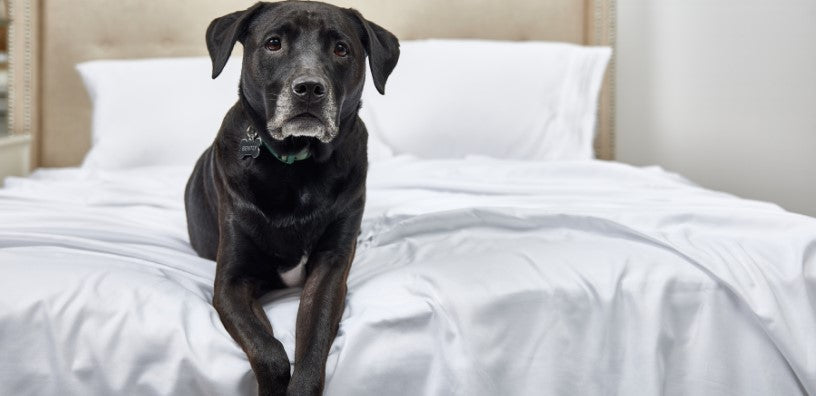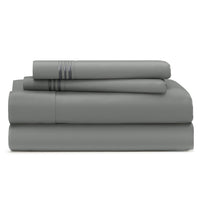
Bamboo or Cotton Sheets: Which is Better?
No matter how small, every conscious choice is a step in the right direction. What does that have to do with bamboo and cotton bedding? Keep reading to find out.

What are 100% Bamboo Bed Sheets?
You’ve probably seen the mega wave of bamboo bedding popping up everywhere. But what exactly is it?
Viscose, derived from bamboo plants, is used as a textile fabric. It’s known for its unmatched softness, unique moisture-wicking abilities, and temperature-regulating properties. Bamboo viscose material can be made by harvesting and crushing the bamboo into a mushy paste. As the natural enzymes break down the plant, the fibers can then be combed out and spun into yarn. That yarn is then turned into a weave and blended with microfiber polyester to create a super soft and gentle fabric - our very own Cosy House bed sheets!

What are cotton bed sheets?
100% cotton bedding is a popular fabric on the market today. But plenty of bedding connoisseurs don’t know that cotton is not a mindful option.
Cotton itself is the well-known white, fluffy staple fiber mostly composed of cellulose.
Cotton production requires an excessive amount of water, energy, and chemicals. Here are a few quick facts you probably didn’t know:
- Cotton uses up a lot of chemicals: Billions of dollars are put into spraying chemicals onto cotton crops annually, and these chemicals can soak into the soil, harming both flora and fauna [1]. Not to mention, they’re harmful to farmers and agricultural field workers.
- Cotton drinks up a lot of water: Cotton loves to slurp up water. In fact, cotton production requires so much water consumption that it has become an environmental issue - about 20,000 liters to produce just 1 kilogram of cotton (that’s enough cotton to make a t-shirt and maybe some pants) [1]. In countries prone to droughts or struggling with water shortages, cotton’s consumption of water has a huge impact [2].
- Cotton takes up a lot of energy: Cotton textile processing and manufacturing uses a whole lot of electric energy to get the job done. A Turkish study found that cotton production consumed a total of 49.73 GJha−1 (net energy gain) - in that total, 31.1% was diesel energy consumption, followed by fertilizer, then machinery energy [3].
Why don’t we love cotton bed sheets?
- Cotton is stuffy: Unlike bamboo viscose sheets, cotton sheets love to trap and collect irritants that can drive you and your nose wild. Cotton sheets lack the gentle, hypoallergenic properties that bamboo viscose fabric has. That means sacrificing your comfort (and we really don’t love that for anyone).
- Cotton is hot: While you sleep, your body releases heat. Traditional cotton sheets trap this heat, making you uncomfortable and sweaty. Again, this means cotton sheets can ruin the comfy coziness everyone’s sleep truly deserves.
- Cotton isn’t kind to skin: Cotton loves, loves, loves to soak up moisture and water. Because of this feature, cotton sheets absorb the moisture from your body during the night. That means more icky, gross buildup and more trips to the washing machine. Bottom line: Cotton probably isn’t great for your skin or nose, and it’s taking up more of your time because it has to be cleaned more often. We say, “No thanks.”

Why is 100% viscose derived from bamboo better?
You know it’s time to switch to some seriously snuggly 100% Bamboo Sheets when your old, heavy, stuffy cotton sheets are beginning to rip and tear easily. You also know the time has come to make the switch when those same cotton sheets are keeping you up at night.
Still not sure why bamboo viscose bedding is better? Not a problem - we’ve got even more reasons to join the hundreds of happy Cosy customers loving their 100% Bamboo Bed Sheets!

Care
Why do we love bamboo plants so much?
- Bamboo is a renewable resource: Bamboo is one of the fastest-growing renewable sources on the planet and uses less water than cotton, making bamboo viscose bed sheets the more mindful option. Some bamboo species can grow up to 3 feet per day and can range in height from four to six inches for small species and 130 feet for larger [4].
- Bamboo doesn’t take up a lot of space: Unlike cotton yield, bamboo plants don’t need too much space to produce a large crop. In fact, bamboo plants are able to regrow without even being replanted. Here’s a fun fact: Bamboo plants are capable of yielding 20 times more timber than trees in the same amount of space [4].
- Bamboo likes fresh air: Did you know that bamboo plants are able to make 35% more oxygen than a hardwood forest [5]? That means bamboo also has a continuous absorption rate of carbon dioxide, helping to create a balance of oxygen and carbon dioxide in our atmosphere [5].
- Bamboo likes fresh soil: Not only are bamboo plants a renewable resource with an amazing growth rate, but they also help to rejuvenate the soil and grow in varied climatic conditions [5]. Bamboo has an extensive root system, which may also help to reduce rain runoff and prevent soil erosion, too [4,5].
Comfort
Why do we love 100% Bamboo Bed Sheets so much?
- Bamboo viscose is ultra-soft: Breathable, lightweight, and oh-so-soft, bamboo viscose bedding is much softer than cotton. That means your comfort comes first with bamboo viscose sheets. The naturally feathery-soft texture of bamboo viscose fabric makes it feel like silk to the touch.
- Bamboo viscose is hypoallergenic: Sheets made from bamboo viscose are safe for sensitive skin and noses because they can naturally ward off common household non-living allergens. No more waking up stuffy because of those cotton sheets!
- Bamboo viscose is cooling: Never sleep hot again! Bamboo viscose fabric’s temperature-regulating and moisture-wicking properties help circulate airflow, wicking away excess body heat for a cooler sleep every time.
- Bamboo viscose is durable: Compared to traditional Egyptian or Pima cotton sheets that boast a high thread count at an even higher price, premium bamboo viscose blends are actually much, much stronger. This strength translates to a durable material that resists pilling, staining, and wrinkles, wash after wash.
Cost
Why else should you consider bamboo over cotton?
- Bamboo viscose is cheaper than cotton: If you’re the type to place more value on durability, comfort, coolness, and a better night’s rest, 100% Bamboo Bed Sheets are the way to go. In general, bamboo sheets give you higher quality for less money than those pesky higher thread count and higher-priced cotton sheets. So, that means bamboo viscose sheets are wallet-friendly AND are more bang for your buck. What’s not to love?

The Cosy Guarantee
It’s pretty obvious that bamboo viscose bedding is superior to cotton. That’s why we’ve integrated this incredible material and all its premium qualities into our other products. We know you care about what goes into your homes, and we do, too, so we’ve carefully crafted all of our products with you in mind. Check out our Luxury Towels made with bamboo viscose, or our Luxury Pillows paired with a cooling bamboo viscose case, or click here to discover even more Cosy products. We’re sure you’ll love them as much as we do.
Bamboo is versatile, mindful, and the best option for your home at a price you’ll love. Make the switch today!
What do you think about the bamboo viscose vs cotton debate? Have you ever considered bamboo viscose over cotton sheets? Let us know in the comments below! The Cosy community would love to hear from you.
Stay cozy out there!
We've gone ahead & enclosed a 10% off coupon below for you to use if you'd like to take the plunge and try out our sheets for yourself! To shop our collection & get 10% OFF Use the code 'BLOG10' at checkout.
Resources:
- Griffin, L., Brauman, K., Schmitt, J., & Voorhees, M. (2017). From Seed to Product: An Interdisciplinary Approach to Linking the Agriculture and Industrial Stages of Cotton through Water Research. Retrieved from https://www.iastatedigitalpress.com/itaa/article/1834/galley/1707/view/
- Chapagain, A., Hoekstra, A. Y., Savenije, H. H. G., & Gautam, R. (2017, May 11). The water footprint of cotton consumption. University of Twente Research Information. Retrieved from https://research.utwente.nl/en/publications/the-water-footprint-of-cotton-consumption.
- Ibrahim Yilmaz, Handan Akcaoz, Burhan Ozkan, An analysis of energy use and input costs for cotton production in Turkey, Renewable Energy, Volume 30, Issue 2, 2005, Pages 145-155,ISSN 0960-1481, https://doi.org/10.1016/j.renene.2004.06.001..
- Wikimedia Foundation. (2022, May 24). Bamboo. Wikipedia. Retrieved from https://en.wikipedia.org/wiki/Bamboo.
- Shrujal Jayesh Kumar, B., & Syeda, A. (2014, December). A case study on bamboo as green building material. ISSN: 2249 – 8958, Volume-4 Issue-2. Retrieved from https://internationalgbc.org/wp-content/uploads/2021/06/0165_10.1.1.678.7429.pdf.


